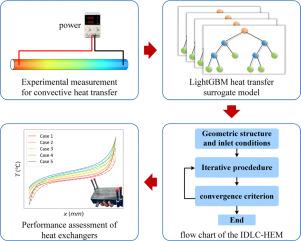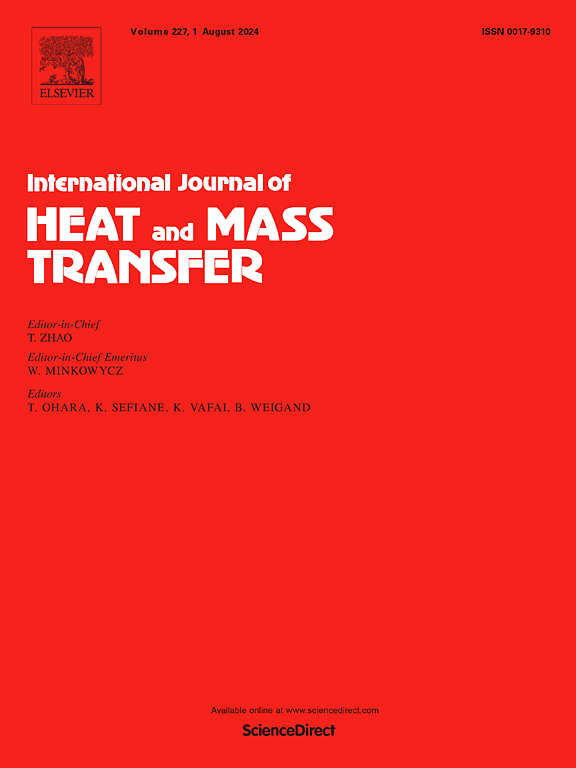Integrated data-driven local characteristic general framework for heat exchanger modeling for supercritical pressure fluids
IF 5.8
2区 工程技术
Q1 ENGINEERING, MECHANICAL
International Journal of Heat and Mass Transfer
Pub Date : 2025-03-03
DOI:10.1016/j.ijheatmasstransfer.2025.126882
引用次数: 0
Abstract
Supercritical pressure (SCP) fluid heat exchangers are increasingly utilized in industrial applications owing to their high compactness and superior heat transfer efficiency. However, existing modeling methods cannot achieve both effective and accurate predictions of heat exchanger performance owing to the significant variations in the thermal properties of SCP fluids. In this study, we propose an integrated data-driven local characteristic general framework for heat exchanger modeling (IDLC-HEM) for SCP fluids that aims to achieve effective dimensionality-reduction modeling and performance assessment for a wide range of heat exchangers. Here, to improve the applicability of the IDLC-HEM to various heat exchanger configurations, we develop a heat transfer surrogate model based on the light gradient boosting machine algorithm. This model, built on a SCP CO2 convective heat transfer database encompassing 428 working conditions, is integrated into the iterative procedure. The performance of the IDLC-HEM in one- and two-dimensional heat exchanger modeling is evaluated using printed-circuit and microtube heat exchangers, respectively. The results indicate that the deviations between the calculated results of the IDLC-HEM and the ground truth remain below 10%, while the deviation derived by logarithmic mean temperature difference method range from 81% to 473%. Furthermore, a comprehensive performance analysis is conducted for heat exchangers under varying operating parameters. IDLC-HEM offers a practical framework for artificial intelligence-assisted heat exchanger design. As the database expands and surrogate model develops, it can be further promoted and applied in complex scenarios such as phase-change heat changers.

超临界压力流体换热器建模的集成数据驱动局部特征通用框架
超临界压力(SCP)流体换热器由于其高紧凑性和优越的传热效率,在工业应用中得到越来越多的应用。然而,由于SCP流体热性质的显著变化,现有的建模方法无法实现对换热器性能的有效和准确预测。在这项研究中,我们提出了一个集成的数据驱动的局部特征通用框架,用于SCP流体的换热器建模(IDLC-HEM),旨在实现广泛的换热器的有效降维建模和性能评估。在这里,为了提高IDLC-HEM对各种换热器配置的适用性,我们开发了一个基于光梯度增强机算法的传热代理模型。该模型建立在包含428个工况的SCP CO2对流换热数据库上,并集成到迭代过程中。采用印刷电路和微管换热器分别对IDLC-HEM在一维和二维换热器建模中的性能进行了评估。结果表明,IDLC-HEM计算结果与地面真实值的偏差在10%以下,而对数平均温差法计算结果的偏差在81% ~ 473%之间。并对换热器在不同工况下的性能进行了综合分析。IDLC-HEM为人工智能辅助换热器设计提供了一个实用的框架。随着数据库的扩展和替代模型的发展,可以进一步推广和应用于相变换热器等复杂场景。
本文章由计算机程序翻译,如有差异,请以英文原文为准。
求助全文
约1分钟内获得全文
求助全文
来源期刊
CiteScore
10.30
自引率
13.50%
发文量
1319
审稿时长
41 days
期刊介绍:
International Journal of Heat and Mass Transfer is the vehicle for the exchange of basic ideas in heat and mass transfer between research workers and engineers throughout the world. It focuses on both analytical and experimental research, with an emphasis on contributions which increase the basic understanding of transfer processes and their application to engineering problems.
Topics include:
-New methods of measuring and/or correlating transport-property data
-Energy engineering
-Environmental applications of heat and/or mass transfer

 求助内容:
求助内容: 应助结果提醒方式:
应助结果提醒方式:


